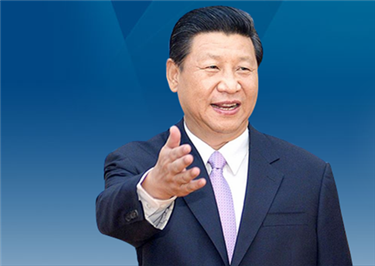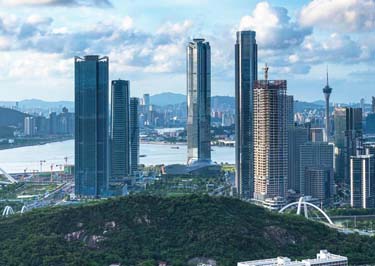Tsai Shou Kee (Cai Shaoji)
Founder and first president of Peiyang (Tianjin) University
1
In the 8th lunar month of 1895, Emperor Kuang-hsu (Guangxu) penned remarks on a memorial to the throne by the Viceroy of the Province of Chihli (today's Hebei), thus steering Chinese education toward the western style led in part by a native of Zhuhai.
Peiyang Western Study School (北洋西学学堂), the first official institution of higher learning in modern China, came into being in Tianjin, where the Westernization Movement originated. The school adopted an American university system encompassing undergraduate and preparatory course programs. It was renamed Peiyang University in 1903.
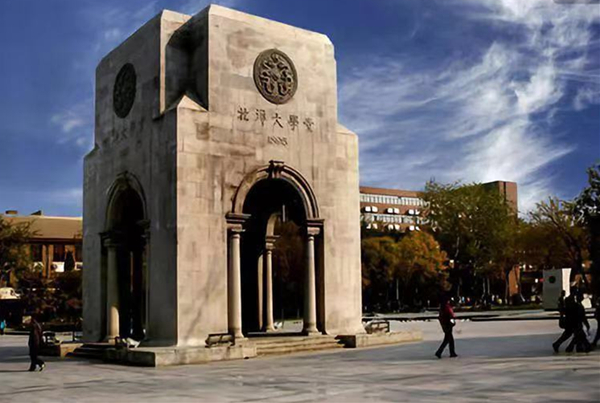
Peiyang University [File photo]
Upon returning from Yale University, Tsai Shou Kee was recommended by leading Chinese statesman of the 19th century, Li Hung-chang (Li Hongzhang), and Intendant of Tientsin Customs, Sheng Hsuan-huai (Sheng Xuanhuai), to take the post of superintendent and then chief superintendent of Peiyang University for 11 years.
2
Tsai Shou Kee, who was born in Beiling Village, Gongbei, in March 1859, was one of the first-detachment Chinese Educational Mission (CEM) students to study in America.
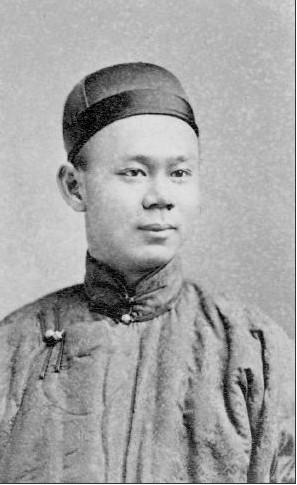
Tsai Shou Kee in his teens (Cai Shaoji) (1860-1933) [File photo]
Two stone lions guard the front of the Tsai's Family Shrine, denoting the family as Earl of the First Rank in the Qing Dynasty (1636-1912). The title and rights that go along with it were bestowed by Empress Dowager Tz'u-his (Cixi) when Tsai served as an Imperial Interpreter in The Palace of Heavenly Purity.
Tsai had enrolled at Yale University after studying for nine years in Massachusetts.
3
At the Class of 1879 graduation from Hartford Public High School on April 17, 1879, Tsai was one of ten students appointed to deliver a commencement speech (Hartford Daily Courant, March 4, 1879, p. 2) in front of the Harford mayor, Connecticut education director, and other guests. He spoke passionately about “The Opium Trade” condemning British trade policies toward China, and the speech was well-received.
He defined opium as "degrading dirt" and "the direst poison" and presented photographs of the horror of an opium addict before and after death. He blasted the opium trade, stating, "It was worse than murdering a man with a knife to sell him this poison."
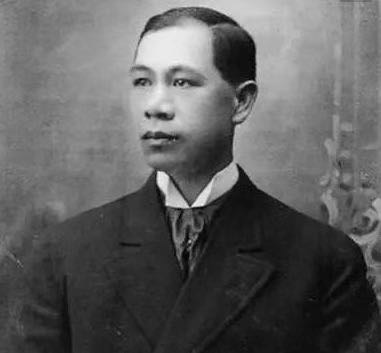
Tsai Shou Kee in his youth [File photo]
His speech drew warm applause. He concluded by saying, "China is not dead, only sleeping, and will eventually rise to the proud station in the world which God has destined her to fill."
4
Tsai enrolled at Yale College to major in law that year. He became a member of Kappa Sigma Epsilon Freshman (secret) Society and The Orientals -- the CEM Baseball Team.
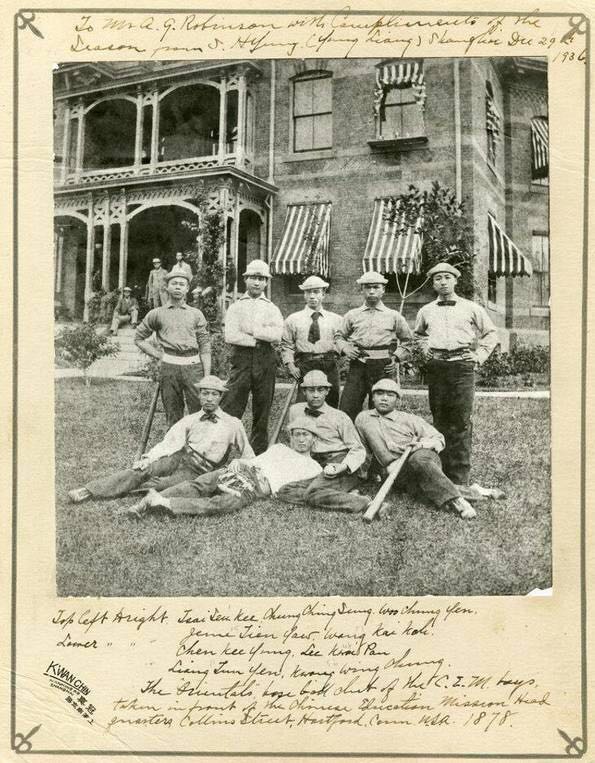
Orientals baseball team with Tsai Shou Kee standing at far left [File photo]
Tsai Shou Kee was summoned back to China in 1881 to translate at first for Shanghai Customs Taotai Yamen, and then Niuzhuang Customs Taotai, Tientsin (Tianjin) Customs Taotai, and Superintendent of Trade for the northern ports in the Viceroy's Residence of Chili. On behalf of the Qing Government, he negotiated with Japan concerning the recession of Liaodong Peninsula after the Japan-Russia War as he defended the nation's sovereignty.
Proposed by Li Hung-chang and initiated by Sheng Hsuan-huai, Peiyang University was founded based on the idled facility of The Council Study (博文书院) to introduce western learning and cultivate talented practical personnel for China.
Tsai was designated as superintendent of the pre-college department while Ng Choy or Ng Achoy (Wu Tingfang) became superintendent of the college sphere. Wang Ch'unghui (Wang Chonghui), a celebrated diplomat in modern China and first graduate, was awarded "The First Imperially Written Diploma" by Emperor Kuang-hsu in 1900.
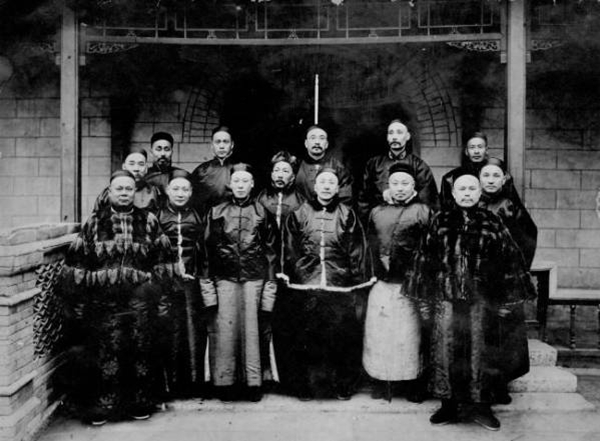
1905 reunion of Chinese Educational Mission students in China with Tsai Shou Kee at left in front row [Photo courtesy kaga.wsulibs.wsu.edu]
The university was renamed National Peiyang University in 1913.
Peiyang University was suspended when the Eight-Power Allied Forces attacked Tientsin and occupied The Council Study where the institution was located. Taking advantage of being recognized for handling foreign affairs, Tsai repeatedly negotiated to reopen the university. All his efforts were in vain, however, so he moved the school to the deserted Xigu Arsenal.
Peiyang University reopened in Xigu, Tientsin, in 1903 and Tsai resumed his post as superintendent.
5
Tsai Shou Kee was exposed to great danger for supporting the revolution led by Dr Sun Yat-sen against Yüan Shih-k'ai (Yuan Shikai), Chinese army leader and reformist minister in the twilight of the Qing Dynasty (until 1911) and then first president of the Republic of China (1912–16). He then resigned and engaged in industrial operations in Tientsin.
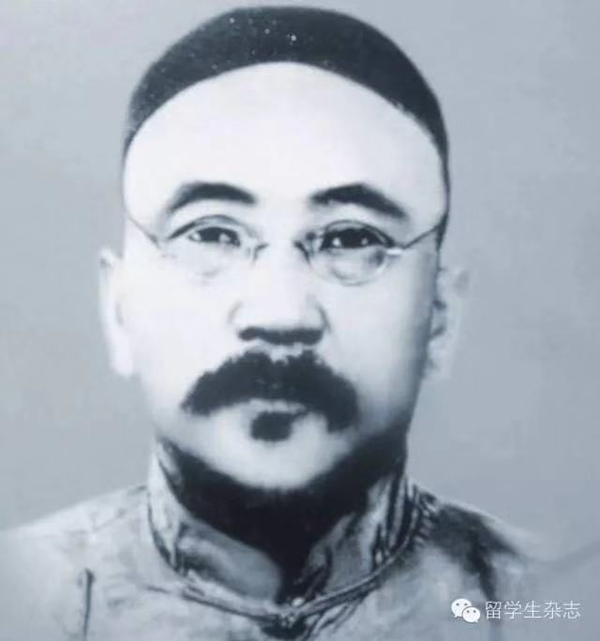
Tsai Shou Kee (1860-1933) [Photo courtesy Overseas Students Magazine]
Tsai was board chairman of Xiannong Real Estate Co, a joint venture with a British businessman, for holding 51 per cent share. He donated 1,000 taels in building Tientsin's Yaohua High School and helped develop "Yaohuali" residential area, providing lodging and education for Chinese in the American Settlement.
He then built the luxurious Da Luo Tian, a composite amusement park where Mei Lan-fang (Mei Lanfang), arguably China's greatest actor in elevating the female dan roles to the lead in Peking Opera, staged performances along with other noted counterparts. Famous American movie actors Charlie Chaplin and Douglas Fairbanks Jr accepted invitations to visit his residence in Tientsin.
6
Having dedicated himself to national education and revitalization, Tsai Shou Kee was revered by the public.
Tsai lived in the "white small building" in his later years. He had been elected councilor of the British Settlement for three successive years, becoming the first Chinese councilor in Tientsin's foreign settlements.
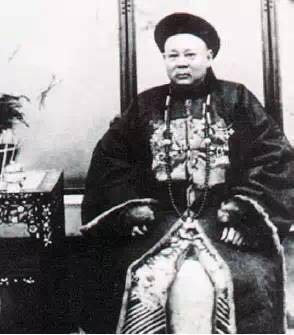
Tsai Shou Kee in middle age [File photo]
Tsai died of disease on May 23, 1933. On the day of his funeral, Tientsin's British Settlement flew the flag at half-mast in mourning, the Tientsin Municipal Council chairman carried the horsetail whisk, and a British policeman led the Honor Guard for him.
It was rare for a Chinese man to receive such an honor from foreign settlements in modern China.
Peiyang University was renamed Tianjin University in September 1951. At the university's 110th anniversary celebration, Tsai Shou Kee's picture was displayed on Peiyang Square for students to pay their respects.
7
Although he seldom went back to his hometown, Tsai Shou Kee donated money to build Beiling Primary School, which has been renovated up to provincial standards. It has been renamed Tsai Shou Kee Primary School.
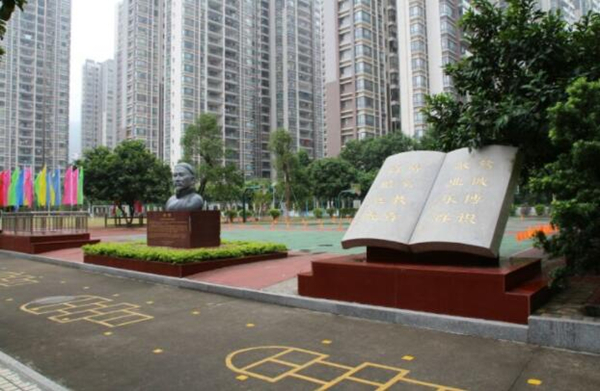
Tsai Shou Kee Primary School (Former Beiling Primary School) [Photo by Wang Shengli]

